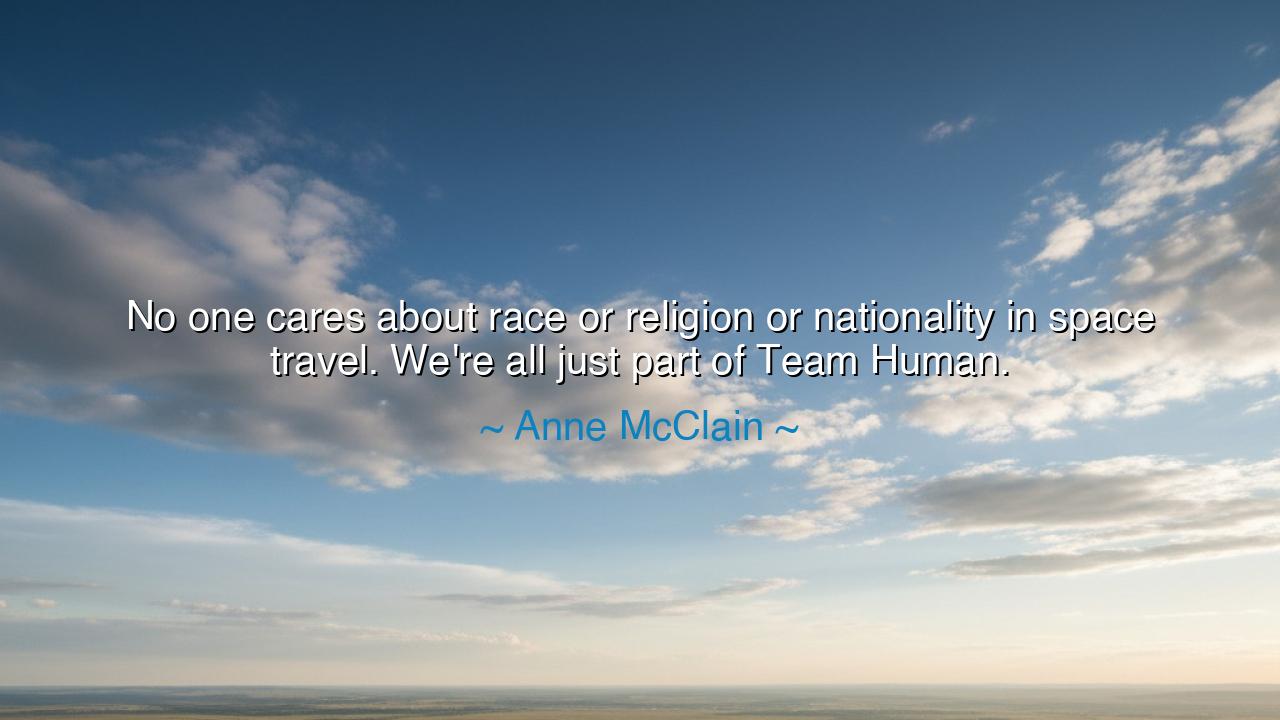
No one cares about race or religion or nationality in space
No one cares about race or religion or nationality in space travel. We're all just part of Team Human.






"No one cares about race or religion or nationality in space travel. We're all just part of Team Human." These words, spoken by Anne McClain, a pioneering astronaut, speak to the fundamental unity of humanity. When we venture into the vast unknown, beyond the borders of Earth, all divisions—race, religion, and nationality—fade into the background. In space, there are no distinctions, no walls separating one from another. There is only the shared mission of humanity, striving together for the greater good. McClain’s insight serves as a profound reminder that at our core, we are all part of a much larger collective, bound by the same dreams and struggles, united in our pursuit of exploration, understanding, and progress.
In the ancient world, the idea of unity among all human beings was often expressed through myths and stories of collective endeavors. The Greeks, for instance, told tales of the Titanomachy, the battle between the Titans and the Olympian gods, in which even gods who were once divided by rivalries and conflicts were eventually brought together for a common cause. Their unity in battle was symbolic of the potential for all peoples to unite in the face of overwhelming odds. Likewise, in ancient Rome, the phrase "Civis Romanus Sum" (I am a Roman citizen) transcended individual ethnicities and origins, uniting people under the banner of Roman identity, fostering a sense of belonging that went beyond national or racial identity.
However, in McClain’s vision, this unity is not constrained by the ancient power structures of empires or kingdoms. Rather, it represents a collective spirit, a recognition that humanity—regardless of our diverse backgrounds—is united by our shared experiences and our common destiny. Space travel, in its highest form, is not just about scientific discovery, but about human discovery. It is an opportunity for the entire species to see itself not as fragmented into separate parts, but as a single, interconnected whole. This idea transcends borders and barriers of all kinds, inviting us to look beyond the limitations of Earth’s divisions and embrace the infinite possibilities of human cooperation and understanding.
This sentiment was echoed during the Cold War, when the United States and Soviet Union were bitter enemies, yet in the final days of the Space Race, the Apollo-Soyuz Test Project in 1972 united astronauts from both superpowers in a historic mission. For a brief moment, the space race—which had been a point of fierce competition and nationalism—became a symbol of international cooperation. On that mission, astronauts from the U.S. and the U.S.S.R. shook hands in space, demonstrating that in the vacuum of space, all that mattered was the human connection, the shared objective of scientific progress and the betterment of all humankind. McClain’s statement draws from this legacy, suggesting that space offers a unique perspective on what truly binds us all as human beings.
When McClain speaks of Team Human, she is not only invoking the idea of scientific and exploratory collaboration, but also calling for a paradigm shift in how we view humanity. In our daily lives on Earth, it is easy to become entrenched in tribalism, defined by race, religion, and nationality. But as McClain points out, when we look outward, beyond the confines of our earthly divisions, we see a common thread. Humanity is the true unifying force, and it is only by embracing this collective identity that we can overcome the deep divisions that often separate us.
The lesson here is that in times of great challenge and progress—whether through space travel or global crises—the things that divide us are less significant than the shared human experience that connects us. Whether it is scientific progress, human rights, or global peace, it is the understanding of our common humanity that can propel us forward. We must embrace our shared destiny and responsibility to each other, not just as citizens of separate countries, but as members of Team Human.
To apply this wisdom to our own lives, we must work toward unity in our communities, seek to understand those from different backgrounds, and foster relationships that are based on our shared humanity rather than the divisions that separate us. It is through this unity that we can tackle the greatest challenges facing us, from climate change to poverty, from conflict to inequality. In the same way that astronauts from different countries work together for the advancement of human knowledge, we, too, can work together to build a world where all people are seen and valued equally. Let us remember McClain’s call to unity and see ourselves not as separate nations, but as one global community, capable of achieving greatness when we act as Team Human.






AAdministratorAdministrator
Welcome, honored guests. Please leave a comment, we will respond soon